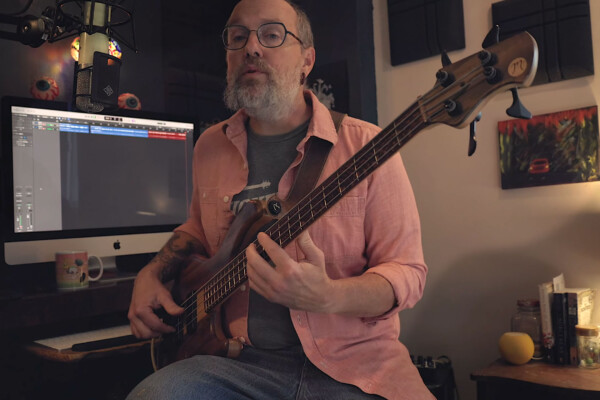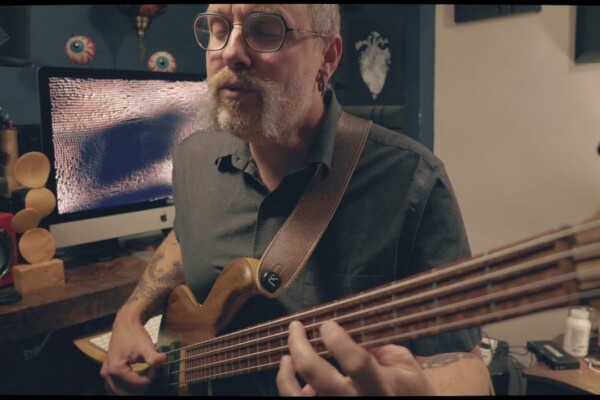Horror Films and Sunday School: An Interview with Aaron Gibson
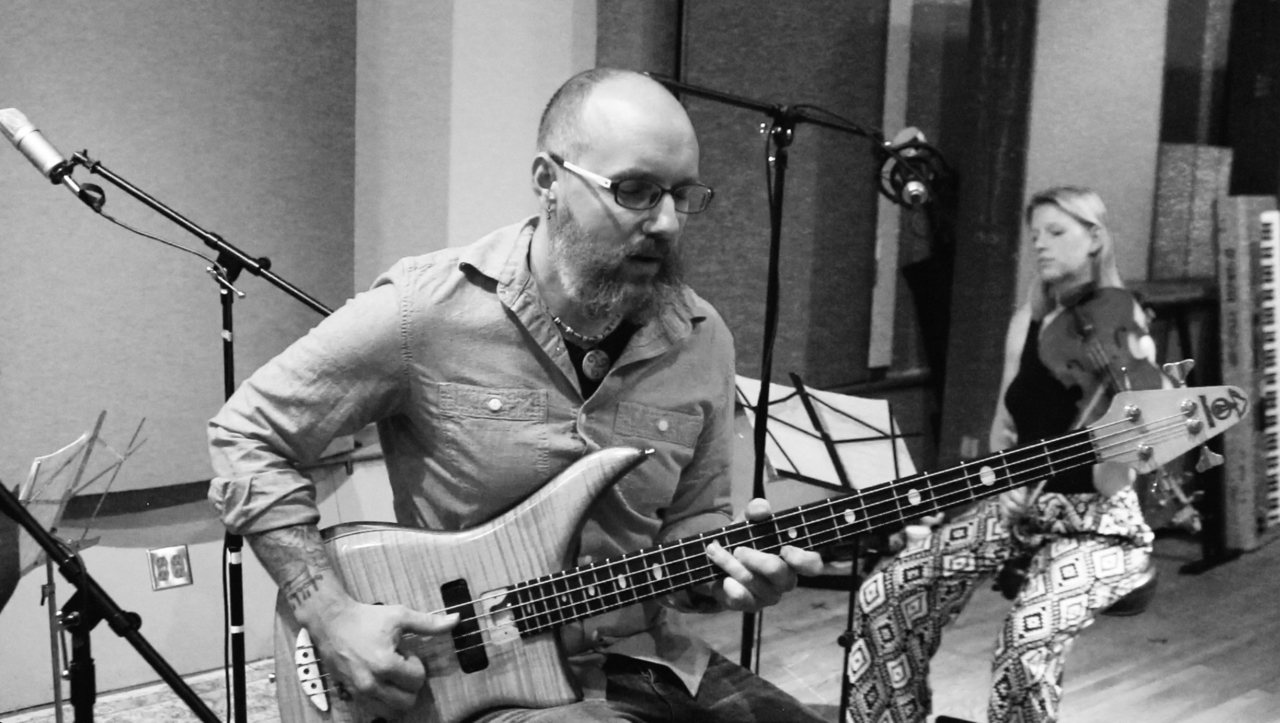
Bassist and singer/songwriter Aaron Gibson has just released his latest album, entitled Horror Films and Sunday School. Along with his signature musical style, the album is filled out by a string quartet and guest artists who help to weave Gibson’s songs into thicker tapestries of sound. The arrangements (and some of the playing) are thanks in part to producer Nahuel Bronzini, who the bassist says made a huge impact on the eight-song collection.
Gibson’s minimalist songs may be filled out with strings, but the sound and content are as intimate as ever. The songs stemmed from a tough time in the bassist’s life that he miraculously transformed into a gorgeous piece of art.
We caught up with Gibson to talk about the album’s inspiration, his collaboration with Bronzini, and the obstacles of writing songs as a solo bassist.
How did this album come about?
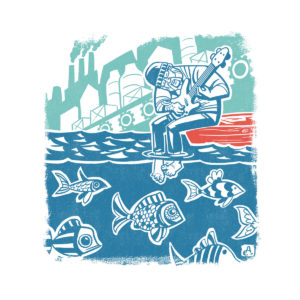 It started with “Full Dark”. I moved my mother back to the States and into our home because her cancer was progressing. My wife and I got a plane from Atlanta to Portland, Oregon to clean out her storage unit and bring her things home. The morning after we arrived, we got a text saying that our son’s friend, who grew up in our home and whom we loved, was dead. Then we had to drive back to Atlanta. I wrote “Full Dark”, and several lyrics that landed in the other songs in my head along the way. I felt like this song needed to be produced, so Nahuel and I set everything up and made it happen. The results were beyond my expectations, and that lead to talks about the other songs and then a funding campaign. My mom passed away a few months later.
It started with “Full Dark”. I moved my mother back to the States and into our home because her cancer was progressing. My wife and I got a plane from Atlanta to Portland, Oregon to clean out her storage unit and bring her things home. The morning after we arrived, we got a text saying that our son’s friend, who grew up in our home and whom we loved, was dead. Then we had to drive back to Atlanta. I wrote “Full Dark”, and several lyrics that landed in the other songs in my head along the way. I felt like this song needed to be produced, so Nahuel and I set everything up and made it happen. The results were beyond my expectations, and that lead to talks about the other songs and then a funding campaign. My mom passed away a few months later.
I had a hard time making a living in Georgia, so I tricked out a van and hit the road for work until I could re-establish my family in Oregon. This is all heavy and depressing stuff, so I’ll save the rest of that story for another time, or you can just listen to the record. I processed my grief by making stuff out of wood and making music. The rest of the album was written and recorded in that van while I was out on the road.
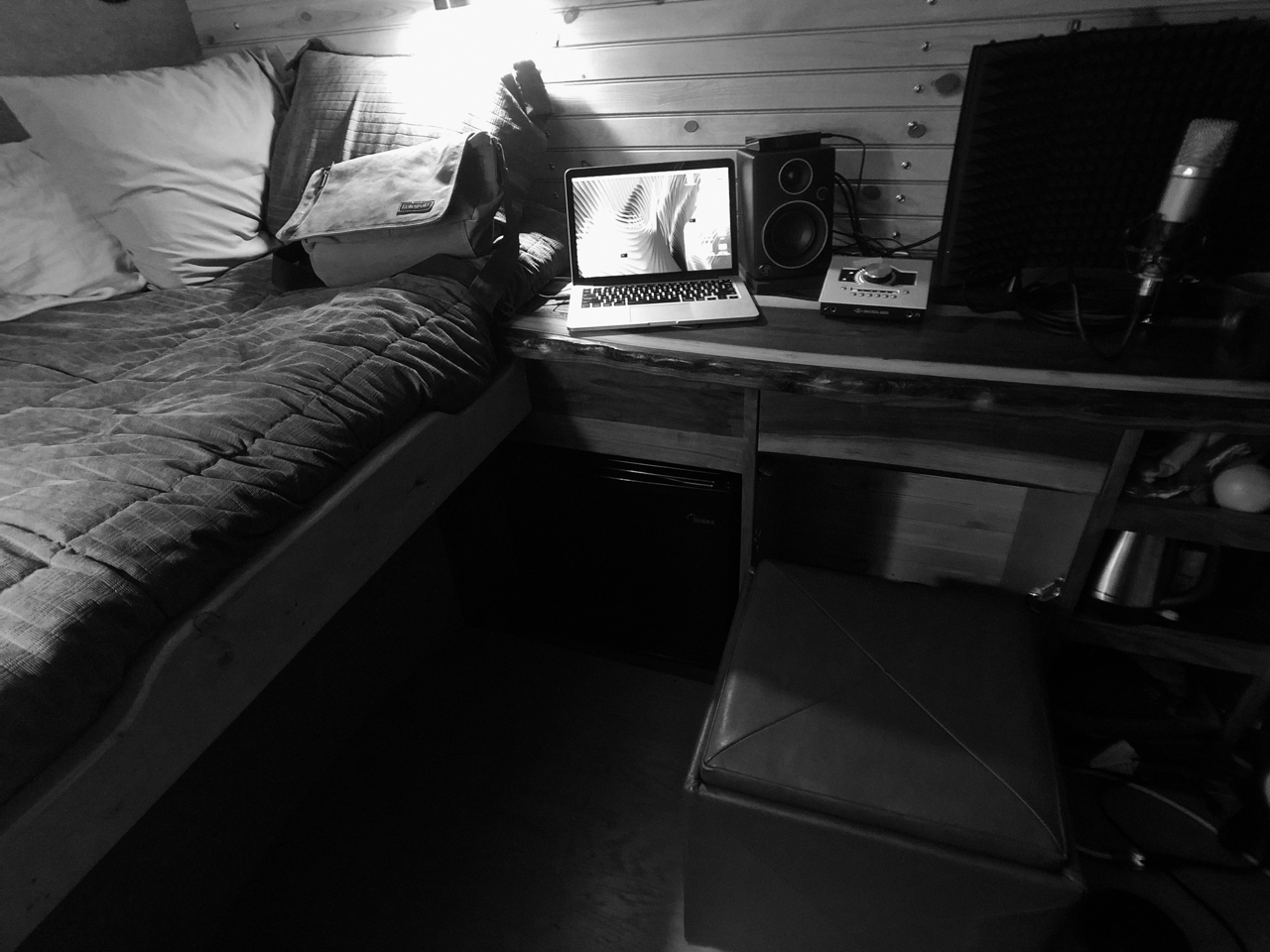
You Kickstarted this project. Did you enjoy that process?
I did not. If you are not in a solid place in your life, a Kickstarter campaign is not a great idea. I was working hard on the album consistently, but there was always a bit of a nagging pressure about making my backers wait. I really appreciate the people who opened their wallets to help, and I felt bad about every delay. The Kickstarter funds amounted to one fourth of the total cost of the project, so I had to come up with a lot of cash to make it all come together and that added to the time frame. One of the rewards for the campaign was vinyl, and waiting for manufacturing is the last piece of the puzzle before I can call it done.
Can you explain the album title?
I woke very early one morning in the van and wrote:
“Long ago I had a family,”
then I wrote,
“but the birds left with all the fire
and the light was in our eyes
then I walked until noon
then I walked until morning
but the day came too soon.”
My losses and travels left me in a post-apocalyptic frame of mind and I mentally pictured walking in a wasteland while I played this little repeating rhythm, it was like a pulse. And I elaborated on the scene, and I thought about telling the character, “Hey, you shouldn’t be shocked by the state of the world, didn’t you ever watch horror films… or go to Sunday school?”
When writing the songs, did you envision the string arrangements, or did those come along later?
That is a hard question, because each song has it’s own story. They are like kids with different personalities and different rates of growth. I could certainly hear auxiliary string parts, melodies, and rhythms attached to my solo bass versions, but I am a minimalist and I like to leave some things out on purpose so the listeners can imagine them. I try to use my imagined parts to add flavor to my foundational bass work or my voice to broaden the texture of a song. Nahuel is surprisingly good at picking up on that stuff and basing his arrangements on the little nuances. I would never want to get in the way of that or influence Nahuel’s creative process, so the string arrangements I may have envisioned are nothing like the end result.
How did you start working with Nahuel Bronzini? What is your working relationship like?
I looked around online for someone who did arrangements for string quartets, and I found Nahuel. He had this fantastic album called The String Quartet Experience that he had done with a bunch of different songwriters and I was very interested in talking with him about it. I liked what I heard enough to hire him to write some parts for “Sam’s Song” (which became “Full Dark”). I wanted the strings to have their own voice and I wanted them to interact with the song; I didn’t want generic strings that just went along with the changes, so I told Nahuel to be as creative as he wanted to be and that would be our starting point. He sent me a demo using midi/sampled sounds to show the arrangement ideas he had. I remember being on the road at some crappy hotel when I downloaded this short clip of the song. I briefly laughed out loud at how delightful it was. Nahuel’s voice and ideas were so playful and yet never stomped on the bass and vocals. It gave me hope.
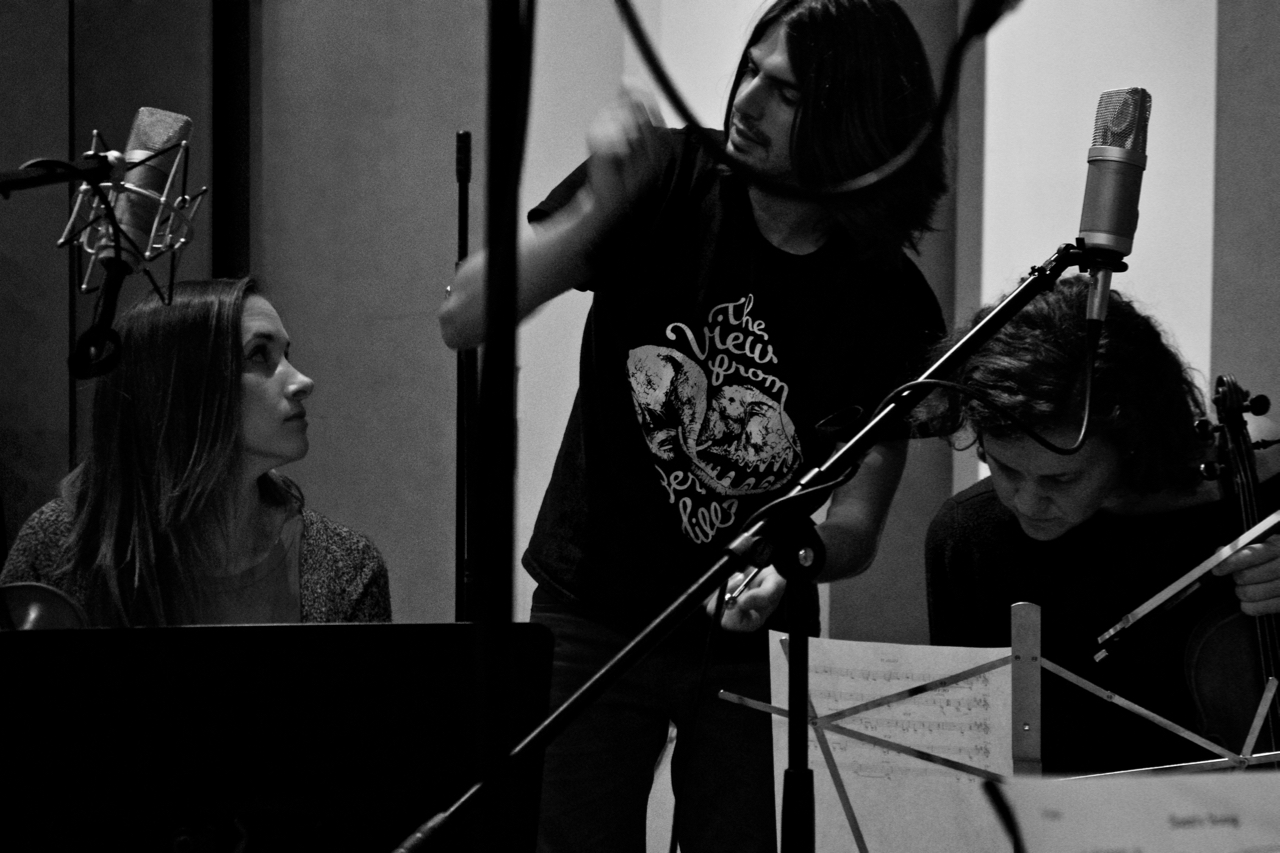
At the time I had no idea of the vast scope of Nahuel’s talent. Nahuel and I worked our way through the five songs with string arrangements and grew closer as friends and collaborators as we progressed. After we finished “Boy”, I asked him to play his guitar on it and was blown away again. I was excited to send him “Hand in Hand” and “Horror Films” to mess with and he turned out to be just as creative on the piano and electric guitar as he is with the quartet. I cannot overstate the importance of Nahuel’s work to the sound of this album. Horror Films and Sunday School was interesting because we kind of left each other alone for the creative process. I wrote, arranged and recorded the songs as solo bass songs, then Nahuel wrote arranged and recorded the strings in response.
In addition to his string arrangements and guitar chops, Nahuel is also a brilliant recording engineer and producer with a lot of credits, including recording and editing Fantastic Negrito’s Grammy Nominated Please Don’t Be Dead. We mixed Horror Films and Sunday School over a marathon weekend that forever changed the way that I hear music. I guess the engineers I had worked with before had more of a “set it and forget it” way of mixing. Nahuel’s mix was an intricate and beautiful performance. I can’t help judging everything else I hear now based on that experience. Nahuel is a wonderful friend and I really look forward to our next project together.
You have some great guests on your album. Did you hear their “voices” when writing the songs or came to them later?
Sometimes I know exactly what I want right when I start, so it’s just a matter of working through those tunes. I wrote “Webs” a few years ago after a rare spat with my wife. While I was writing the song, I knew that it needed to be a duet with a female vocalist because I intended it to be filled with back and forth banter. Nahuel had worked on Baeilou’s wonderful Inside Under EP and put me in contact with her. She recorded the vocals as I had envisioned, but the scratch track I had done had this charm about it that we kept coming back to. When I had finished writing “Webs”, it had this middle section that I could hear a melodic, Steve Lawson-ish, solo over. I could totally hear Steve’s tone and phrasing in that spot, but I didn’t think that I would ask him to do it. I also didn’t think that he would say yes and then get it to me within days. It’s brilliant.
Other times I don’t know what’s going to happen till it’s done. “Boy” has been through a couple of drafts with different solo sections. I was listening to the final version and I thought about Jason Everett’s vibe and hoped that he would be interested. I sent him a message and he responded with something like “Omg. Are you kidding?”, and it was set. The song came out great and it’s a super fun solo!
On the title track, I could hear both the cello and the background vocal in my head while writing the song. Nahuel added his fantastic guitar part and I asked Nahuel and Baeilou to come up with the cello part because the song needed that weighty sound just as much as it needed the innocent sounding background voice. I talked my daughter Talitha into recording the vocal, and Baeilou’s cello brought exactly what the song was asking for.
What made you choose to cover Camper Van Beethoven’s “When I Win the Lottery”?
At the beginning, I had been thinking of the album as just a collection of songs. I told Nahuel that I wanted a couple tunes to be just solo bass and a couple tunes to be duets. Side A was going to be quartet songs and side B for the others. One night I suddenly had this flash of inspiration and saw the whole album as one complete thought with a narrative that was based on the archetypal character of each song. I instantly knew the order of the songs and saw this other story that was being told. “See The World” is a song about a specific situation, but if you step back, it is a song about setting forth. “Boy”, a song about growing up. “Hand in Hand”, a song about enduring love, then a song about physical love. After we get through the breakup song, “Webs”, the album plunges into some dark territory and stays there. I felt like there needed to be a rest, or a moment of comic relief before I took my listeners into the dark loneliness of traveling the American road alone, the pain and confusion of processing the death of multiple loved ones and so on.
I tried very hard to write the right song, working up six or seven tunes to fit that bill, but it was no good. I could not get the right tone. I have always loved the Key Lime Pie album and “When I Win the Lottery” just seemed to fit so well. It is a protest song that is completely serious, but funny at the same time. I worked up a solo bass arrangement and I really love it.
Do you find there are any special challenges in composing singer/songwriter style with only a bass?
Absolutely. The most obvious problem is that the music can turn out boring as hell for the listener if it’s not presented right. Minimalism takes a ton of work and a lot of cutting and tweaking in the writing stage in order for it to not suck. The songs have to be solid enough to stand on their own and I have to be able to recognize what parts are important and which parts are just fluff. Most of the songs were given time to mature before recording them, but some of them made it to the record without revision. My kids’ comments help me along and they can be great critics.
How did you record your bass? Did you track vocals at the same time or separate?
All of the bass tracks were recorded direct into my UA Apollo Twin, no bells or whistles. I love the raw sound of my bass, so all EQ and tone shaping stuff was left at zero. I usually leave my knobs in the notch so that sound has to come from what I am doing with my hands.
For the vocals, I wanted the quality to be great and I had in mind the vocal sound that I wanted from the beginning. I kept trying to record the elements separately for clarity, but my brain doesn’t work that way and I don’t write songs that way. Each song was a bit different, but they all seemed to lose something if I wasn’t singing while I played. I ended up recording both parts together in order to get the right bass performance, then I figured I could re-record the vocals to get a clean vocal track. That worked on some songs, but not others. On “Webs”, for example, we used the first scratch track (which I never intended for anyone but Nahuel to hear) because the vibe was just right. I should also mention that the bass and vocal tracks for this album were all recorded in my Ram van whilst traveling the country looking for construction work.
Has your gear changed at all since we last talked?
I have my Alembic four string, and a Darkglass Microtubes 900 going through a twelve inch Mesa speaker from my old Walkabout combo (I have plans to build a functional art piece out of the guts of the combo). I am not usually into effects or things that change the sound of my bass, but I have been loving the M900’s distortion colors.
It was suggested by my wife, that maybe I should see about getting a second bass because I would be up a creek if something happened to my Alembic. I pondered that for a bit, then called Brady Muckelroy about it. Brady is building me a custom HMC with a slightly narrower than normal body, a three-piece neck-through maple neck, lacewood fingerboard, and a myrtle top. Brady is a fantastic bassist, a really nice guy, and his basses are among the best playing instruments that I have touched.
Any plans to tour the album?
I would love nothing more! It’s been really hard to get press for the album and equally difficult to get gigs as a solo bassist, so I will have to do a lot of work to get a tour off the ground. My fanbase is pretty small, so I am not sure what a tour for this would look like. Most likely house concerts and coffee shops unless I can go as an opening act for a larger group. I do have the notation for everything, so I suppose I could hire quartets along the way. I know that Nahuel wants to do shows with this project.
Horror Films and Sunday School is available on BandCamp.

